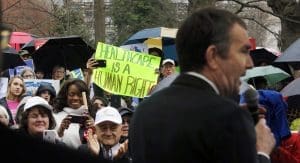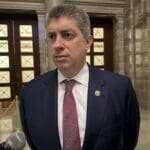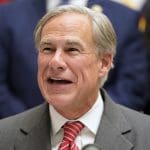Virginia's Medicaid expansion is a success story
The program has helped 550,000 Virginians get health insurance — and has saved the state hundreds of millions of dollars.

In 2018, Virginia Gov. Ralph Northam signed into law a measure that would expand Medicaid coverage in the state.
The program has been a big win for Virginia’s working families.
Since Virginia expanded Medicaid in January 2019, more than half a million Virginians — about 550,000 in total — have started receiving health insurance under the program.
With increased funds from the federal government thanks to the Affordable Care Act’s expansion of the program, the state was able to expand eligibility to hundreds of thousands of Virginians who weren’t eligible for the public health care program before.
The results speak for themselves: Virginia was the only state to see a decrease in its uninsured population in 2019, when its expanded Medicaid program went into effect.
Medicaid enrollment in Virginia and across the country has skyrocketed since the start of the COVID-19 pandemic, as many Americans have faced economic hardship and loss of work. Since March 2020, more than 308,000 Virginians have enrolled in the program, according to state officials.
Medicaid expansion has been a hard-won battle in Virginia. Republican state lawmakers adamantly opposed the program in 2014, when former Virginia Gov. Terry McAuliffe was in office. But after they nearly lost control of the state’s House of Delegates in 2017, Republicans reluctantly voted to expand the program. Northam signed it into law on June 7, 2018.
Despite fears from state Republicans about health care costs, Virginia’s Medicaid expansion efforts have actually saved the state money. In the 2020 fiscal year, Virginia spent $558 million less than expected in Medicaid costs alone. The state is projected to save millions of dollars more this year.
Previously, only the poorest Virginians — families making less than $7,068 per year and disabled adults making less than $9,992 — were eligible for Medicaid.
More than 80 million — or roughly one in four Americans — are now enrolled in Medicaid, according to a Kaiser Family Foundation analysis. That represents a high watermark for the program. In all, 43% of Americans are covered by either Medicaid or Medicare, the national health insurance program for Americans aged 65 and older.
Virginia’s expanded Medicaid program, which is administered by the Department of Medical Assistance Services (DMAS), covers adults aged 19 to 64 with income at or below 138% of the federal poverty limit. That means a Virginia family of four making $36,570 or less per year qualifies for subsidized health care.
Together, these savings constitute a substantial portion of Virginia’s $2.8 billion budget surplus. Lawmakers have used those savings to invest $30 million in police reform, $370 million in education, and $254 million in pandemic-related housing relief. They have also added to Virginia’s Revenue Reserve Fund, which is a sort of rainy day fund for the state treasury.
These savings mainly come from the fact that under traditional Medicaid, states are responsible for 50% of costs — with the federal government covering the other 50% of the costs — but are only responsible for 10% of costs under expanded Medicaid. The federal government currently covers 90% of Medicaid costs under the expanded program.
“Between new revenues and savings, Virginia has likely ‘paid’ for the cost of expansion twice over without including any increased revenue attributable to more economic activity,” the economist Bryce Ward wrote in a 2020 Commonwealth Fund report.
McAuliffe, the Democratic nominee for Virginia governor, whole-heartedly supports Medicaid expansion. He has said he wants to expand the program even further to include Virginians above the maximum qualifying income who may still struggle to pay for health care.
McAuliffe fought for Medicaid expansion during his time as governor, but could not overcome Republicans’ opposition to the measure.
By contrast, Republican gubernatorial candidate Glenn Youngkin has not gone on record saying what he would do with Virginia’s Medicaid program if he wins in November. Youngkin called Medicaid expansion “a very sad thing” during the Republican primary campaign in April.
Youngkin’s campaign did not immediately respond to a request for comment.
Virginians are insured at a much higher rate than their fellow Southerners. In Virginia, 7.9% of people are uninsured, while in the South as a whole 16.4% of residents are uninsured. A study from Duke University found that Medicaid expansion decreases the number of emergency surgeries and reduces the incidences of certain kinds of cancers.
Despite the proven health benefits of Medicaid expansion, eight Southern states have opted not to take federal funds to help offer more residents health insurance. As a result, 2.2 million Americans remain uninsured, stuck in the so-called “coverage gap” of people who don’t qualify for their states’ Medicaid programs despite living in poverty.
Almost all (97%) of these uninsured Americans live in the South, according to the Kaiser Family Foundation.
Health care advocates in other states are trying to copy Virginia’s Medicaid success story. On Oct. 4, Missouri expanded Medicaid to 275,000 people. The Mississippi State Medical Association recently passed a resolution in favor of Medicaid expansion, citing the policy’s flexibility and coverage that Virginia’s plan offers.
In 2019, research from Duke University found that if the 12 states which have not yet expanded Medicaid had done so, 50,000 Americans would have avoided being saddled with “catastrophic” levels of medical debt.
Expanding Medicaid in these states could save 7,000 lives and prevent the accumulation of $2 billion in medical debt each year, a recent analysis from the Center for American Progress found.
Published with permission of The American Independent Foundation.
Recommended

Missouri governor hopeful Bill Eigel rejects affordable childcare proposal
Eigel has previously supported stripping funds from public schools and once opposed an expansion of early kindergarten.
By Jesse Valentine - April 15, 2024
Montana Gov. Greg Gianforte hosts event with religious extremist
J.P. De Gance is the founder of Communio, an organization that uses social media marketing tools to push a far-right agenda.
By Jesse Valentine - March 27, 2024
Texas Gov. Greg Abbott floats building a wall on the Oklahoma border
It’s not the first time Abbott has engaged in Civil War adjacent rhetoric.
By Jesse Valentine - February 22, 2024






































































